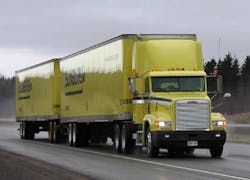The restart rollback stays in and longer twin trailers are left out of the $1.8 trillion combined spending package known as the “omnibus” bill that will fund the federal government for the 2016 fiscal year.
Last year’s bill included language that blocked restart-related changes to the hours of service rule the Federal Motor Carrier Safety Administration handed down in June 2013, pending further study. In contentious Senate committee hearings and in floor debate, those in favor of returning to previous restart rules, led by Sen. Susan Collins (R-ME), argued that the new consecutive 1 a.m. to 5 a.m. rest period requirements led to more trucks on the road in morning rush hour periods and disrupted the sleep patterns of drivers who regularly worked pre-dawn shifts. Critics also questioned the validity of the research FMCSA used to support the requirement, particularly the driver health benefits claimed in the rulemaking.
Safety groups, however, supported FMCSA’s more stringent limits and argued that the driver hour limits should be strengthened further, not relaxed. The 2014 debate was further inflamed by the high-profile accident involving comedian Tracy Morgan and a Wal-Mart Transportation driver who was believed to have been fatigued.
The language in the new bill, expected to be voted on Friday, again requires FMCSA to meet an appropriate safety, driver health and driver longevity standard before re-imposing those restrictions.
“We’re pleased that in the omnibus spending compromise released [Wednesday], Congress has seen fit to demand that FMCSA ‘show its work,’ before imposing unnecessary and onerous restrictions on the use of the 34-hour restart by commercial drivers,” said ATA President and CEO Bill Graves. “FMCSA foisted these restrictions on the industry without doing a proper investigation into how they might impact trucking safety and truck drivers’ health and longevity, so it is completely appropriate for Congress to establish a safety and health standard.”
The Truck Safety Coalition was “disappointed” the Collins rider again was included in the budget bill, and urged members of Congress to no longer use the appropriations process "as a back door to advance industry-backed agendas,” according to a statement.
“Requiring a truck driver to work up to 82 hours per week will only cause more fatigue related truck crashes, and, in turn, more injuries and deaths. Rather than acquiescing to industry demands, Congress should be making data-driven decisions,” said Executive Director John Lannen. “We hope that the release of the Electronic Logging Device (ELD) Final Rule will help law enforcement isolate bad actors and help the FMCSA obtain better data on truck driver fatigue.”
Citing the assistance of “survivors and families of truck crash victims, law enforcement, first responders, truck drivers, trucking companies,” and other safety advocacy groups, the coalition did pick up a legislative win when language to permit twin-33 ft. “pup” trailers was left out of the omnibus package. Such a provision had been part of the standalone THUD funding bill, after making it out of a Senate committee by a single vote.
The Coalition for Efficient and Responsible Trucking (CERT), made up of several of the largest LTL carriers in the U.S., has been a leading proponent of the longer trailers.
“It’s unfortunate and disappointing that political scare tactics won the day over sound policy,” spokesman Ed Patru said in a statement. “In rejecting a modest extension in the length of twin trailers, Congress missed an opportunity to bring long-overdue efficiencies to freight trucking that would have produced tangible safety, economic and environmental benefits at a time when so many roads and bridges have fallen into disrepair after years of neglect.”
ATA also expressed disappointment that the omnibus bill does not allow for “the modest increase” in tandem trailer length.
“We’re disheartened that Congress allowed itself to be cowed by the fearmongering tactics of anti-truck lobbyists,” said ATA Chairman Pat Thomas, senior vice president of state government affairs for UPS. “By removing language that would have allowed twin 33s on U.S. highways, Congress has passed up a huge opportunity to improve highway safety and trucking’s efficiency.”




